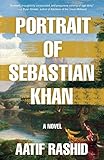We wouldn’t dream of abandoning our vast semi–annual Most Anticipated Book Previews, but we thought a monthly reminder would be helpful (and give us a chance to note titles we missed the first time around). Here’s what we’re looking out for this month—for more March titles, check out our First-Half Preview. Let us know what you’re looking forward to in the comments!
Want to know about the books you might have missed? Then go read our most recent book preview. Want to help The Millions keep churning out great books coverage? Then sign up to be a member today.
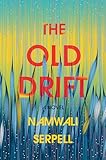 The Old Drift by Namwali Serpell: Described as the “Great Zambian Novel you didn’t know you were waiting for,” this debut novel, from the winner of the 2015 Caine Prize for African writing, tells the story of three Zambian families—black, white, and brown—caught in a centuries-long cycle of retribution, romance, and political change. Serpell asks, “How do you live a life or forge a politics that can skirt the dual pitfalls of fixity (authoritarianism) and freedom (neoliberalism)? And what happens if you treat error not as something to avoid but as the very basis for human creativity and community?” Recipient of a starred review from Kirkus and advance praise from Carmen Maria Machado, Alice Sebold, and Garth Greenwell, The Old Drift is already well positioned to become the Next Big Thing of 2019. (Jacqueline)
The Old Drift by Namwali Serpell: Described as the “Great Zambian Novel you didn’t know you were waiting for,” this debut novel, from the winner of the 2015 Caine Prize for African writing, tells the story of three Zambian families—black, white, and brown—caught in a centuries-long cycle of retribution, romance, and political change. Serpell asks, “How do you live a life or forge a politics that can skirt the dual pitfalls of fixity (authoritarianism) and freedom (neoliberalism)? And what happens if you treat error not as something to avoid but as the very basis for human creativity and community?” Recipient of a starred review from Kirkus and advance praise from Carmen Maria Machado, Alice Sebold, and Garth Greenwell, The Old Drift is already well positioned to become the Next Big Thing of 2019. (Jacqueline)
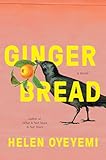 Gingerbread by Helen Oyeyemi: Oyeyemi became a critical darling in 2014 with Boy, Snow, Bird, a retelling of “Snow White.” She takes us back into fairy tale world with Gingerbread, the story of mother and daughter, Harriet and Perdita Lee, and their family’s famous, perhaps…magical, gingerbread recipe. Along with Harriet’s childhood friend Gretel, the Lees endure family, work, and money drama all for the sake of that crunchy spice. (Janet)
Gingerbread by Helen Oyeyemi: Oyeyemi became a critical darling in 2014 with Boy, Snow, Bird, a retelling of “Snow White.” She takes us back into fairy tale world with Gingerbread, the story of mother and daughter, Harriet and Perdita Lee, and their family’s famous, perhaps…magical, gingerbread recipe. Along with Harriet’s childhood friend Gretel, the Lees endure family, work, and money drama all for the sake of that crunchy spice. (Janet)
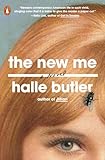 The New Me by Halle Butler: If Butler’s first novel, Jillian, was the “feel-bad book of the year,” then her second, The New Me, is a skewering of the 21st-century American dream of self-betterment. Butler has already proven herself a master of writing about work and its discontents, the absurdity of cubicle life and office work in all of its dead ends. The New Me takes it to a new level in what Catherine Lacey calls a Bernhardian “dark comedy of female rage.” The New Me portrays a 30-year-old temp worker who yearns for self-realization, but when offered a full-time job, she becomes paralyzed after realizing the hollowness of its trappings. (Anne)
The New Me by Halle Butler: If Butler’s first novel, Jillian, was the “feel-bad book of the year,” then her second, The New Me, is a skewering of the 21st-century American dream of self-betterment. Butler has already proven herself a master of writing about work and its discontents, the absurdity of cubicle life and office work in all of its dead ends. The New Me takes it to a new level in what Catherine Lacey calls a Bernhardian “dark comedy of female rage.” The New Me portrays a 30-year-old temp worker who yearns for self-realization, but when offered a full-time job, she becomes paralyzed after realizing the hollowness of its trappings. (Anne)
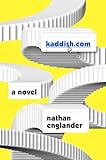 Kaddish.com by Nathan Englander: Pulitzer finalist Englander’s latest novel follows Larry, an atheist in a family of orthodox Memphis Jews. When he refuses to recite the Kaddish, the Jewish prayer for the dead, for his recently deceased father, Larry risks shocking his family and imperiling the fate of his father’s soul. Like everyone else in the 21st century, Larry decides the solution lies online, and he makes a website, kaddish.com, to hire a stranger to recite the daily prayer in his place. What follows is a satirical take on God, family, and the Internet that has been compared to early Philip Roth. (Jacqueline)
Kaddish.com by Nathan Englander: Pulitzer finalist Englander’s latest novel follows Larry, an atheist in a family of orthodox Memphis Jews. When he refuses to recite the Kaddish, the Jewish prayer for the dead, for his recently deceased father, Larry risks shocking his family and imperiling the fate of his father’s soul. Like everyone else in the 21st century, Larry decides the solution lies online, and he makes a website, kaddish.com, to hire a stranger to recite the daily prayer in his place. What follows is a satirical take on God, family, and the Internet that has been compared to early Philip Roth. (Jacqueline)
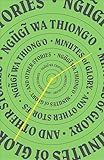 Minutes of Glory by Ngũgĩ wa Thiong’o: Thiong’o, the perennial Nobel Prize contender who once got through a prison sentence by drafting a memoir on toilet paper, has collected his best short stories in this collection, which spans half a century. From “The Fig Tree,” which Thiong’o wrote when he was an undergraduate in Uganda, to “The Ghost of Michael Jackson,” which he wrote while teaching at Irvine, these stories affirm the wide range of a global sensation. (Thom)
Minutes of Glory by Ngũgĩ wa Thiong’o: Thiong’o, the perennial Nobel Prize contender who once got through a prison sentence by drafting a memoir on toilet paper, has collected his best short stories in this collection, which spans half a century. From “The Fig Tree,” which Thiong’o wrote when he was an undergraduate in Uganda, to “The Ghost of Michael Jackson,” which he wrote while teaching at Irvine, these stories affirm the wide range of a global sensation. (Thom)
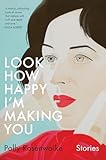 Look How Happy I’m Making You by Polly Rosenwaike: A couple of months ago I zipped through this funny and poignant collection of stories about women grappling with motherhood in many different ways: One struggles with infertility, for instance, and another gets pregnant by accident. Throughout, I was struck by the depth of feeling, not once compromised by the brevity of the form. In its starred review, Kirkus calls it “an exquisite collection that is candid, compassionate, and emotionally complex.” Meaghan O’Connell says, “Each story in Look How Happy I’m Making You is a lovely universe unto itself—funny, intimate, casually profound—but there is something transcendent about reading them together like this.” (Edan)
Look How Happy I’m Making You by Polly Rosenwaike: A couple of months ago I zipped through this funny and poignant collection of stories about women grappling with motherhood in many different ways: One struggles with infertility, for instance, and another gets pregnant by accident. Throughout, I was struck by the depth of feeling, not once compromised by the brevity of the form. In its starred review, Kirkus calls it “an exquisite collection that is candid, compassionate, and emotionally complex.” Meaghan O’Connell says, “Each story in Look How Happy I’m Making You is a lovely universe unto itself—funny, intimate, casually profound—but there is something transcendent about reading them together like this.” (Edan)
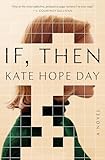 If, Then by Kate Hope Day: In a quiet mountain town, four neighbors’ worlds are rocked when they begin to see versions of themselves in parallel realities. As the disturbing visions mount, a natural disaster looms and threatens their town. From a starred review in Publishers Weekly: “Day’s well-crafted mix of literary and speculative fiction is an enthralling meditation on the interconnectedness of all things.” (Carolyn)
If, Then by Kate Hope Day: In a quiet mountain town, four neighbors’ worlds are rocked when they begin to see versions of themselves in parallel realities. As the disturbing visions mount, a natural disaster looms and threatens their town. From a starred review in Publishers Weekly: “Day’s well-crafted mix of literary and speculative fiction is an enthralling meditation on the interconnectedness of all things.” (Carolyn)
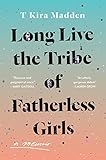 Long Live the Tribe of Fatherless Girls by T Kira Madden: With a sparkling blurb from Mary Gaitskill—“Sad, funny, juicy and prickly with deep and secret thoughtful places”—and a sparkling cover (literally—see her website), T Kira Madden’s debut memoir, a coming-of-age story set in Boca Raton, is primed for buzz. As a grownup, Madden self-describes as an “APIA writer, photographer, and amateur magician”; as a child, “Madden lived a life of extravagance, from her exclusive private school to her equestrian trophies and designer shoe-brand name. But under the surface was a wild instability…she found lifelines in the desperately loving friendships of fatherless girls.” One of the best, most evocative titles of the release season, IMHO. (Sonya)
Long Live the Tribe of Fatherless Girls by T Kira Madden: With a sparkling blurb from Mary Gaitskill—“Sad, funny, juicy and prickly with deep and secret thoughtful places”—and a sparkling cover (literally—see her website), T Kira Madden’s debut memoir, a coming-of-age story set in Boca Raton, is primed for buzz. As a grownup, Madden self-describes as an “APIA writer, photographer, and amateur magician”; as a child, “Madden lived a life of extravagance, from her exclusive private school to her equestrian trophies and designer shoe-brand name. But under the surface was a wild instability…she found lifelines in the desperately loving friendships of fatherless girls.” One of the best, most evocative titles of the release season, IMHO. (Sonya)
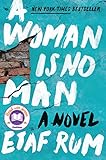 A Woman Is No Man by Etaf Rum: Isra, a 17-year-old Palestinian girl in 1990, prefers reading to suitors, but after her family marries her to an American deli owner she finds herself living in Brooklyn, trapped in a losing struggle against his oppressive mother, Fareeda. Eighteen years later, Fareeda attempts to pressure Isra’s oldest daughter into an early marriage, but an estranged family member offers Isra a chance to determine her own life. Rum, who was born to Palestinian immigrants living in Brooklyn, has written that she hopes her debut novel moves readers “by the strength and power of our women.” (Kaulie)
A Woman Is No Man by Etaf Rum: Isra, a 17-year-old Palestinian girl in 1990, prefers reading to suitors, but after her family marries her to an American deli owner she finds herself living in Brooklyn, trapped in a losing struggle against his oppressive mother, Fareeda. Eighteen years later, Fareeda attempts to pressure Isra’s oldest daughter into an early marriage, but an estranged family member offers Isra a chance to determine her own life. Rum, who was born to Palestinian immigrants living in Brooklyn, has written that she hopes her debut novel moves readers “by the strength and power of our women.” (Kaulie)
 The White Card by Claudia Rankine: The author of Citizen, Macarthur Genius grant honoree, and founder of the Racial Imaginary Institute will publisher her first play, one that examines the concept of whiteness and white Americans’ failures to acknowledge it, through a series of interactions between an artist and an affluent couple. In the play’s introduction, Rankine writes “The scenes in this one-act play, for all the characters’ disagreements, stalemates, and seeming impasses, explore what happens if one is willing to stay in the room when it is painful to bear the pressure to listen and the obligation to respond.” (Lydia)
The White Card by Claudia Rankine: The author of Citizen, Macarthur Genius grant honoree, and founder of the Racial Imaginary Institute will publisher her first play, one that examines the concept of whiteness and white Americans’ failures to acknowledge it, through a series of interactions between an artist and an affluent couple. In the play’s introduction, Rankine writes “The scenes in this one-act play, for all the characters’ disagreements, stalemates, and seeming impasses, explore what happens if one is willing to stay in the room when it is painful to bear the pressure to listen and the obligation to respond.” (Lydia)
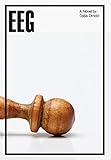 EEG by Daša Drndic: I first encountered Daša Drndic through her novel Belladona in June, unwittingly a mere two weeks after the author’s death from lung cancer. I was struck by the character Andreas Ban, and his idiosyncratic reflection upon ears, that “marvelous ugly organ,” accompanied by a diagram of an ear marked with the body’s points. This character Ban continues into Drndic’s next and final book, EEG, where after surviving a suicide attempt he goes on to dissect and expose the hidden evils and secrets of our times. He’s stand-in for Drndic herself, who wrote emphatically and had stated that “Art should shock, hurt, offend, intrigue, be a merciless critic of the merciless times we are not only witnessing but whose victims we have become.” (Anne)
EEG by Daša Drndic: I first encountered Daša Drndic through her novel Belladona in June, unwittingly a mere two weeks after the author’s death from lung cancer. I was struck by the character Andreas Ban, and his idiosyncratic reflection upon ears, that “marvelous ugly organ,” accompanied by a diagram of an ear marked with the body’s points. This character Ban continues into Drndic’s next and final book, EEG, where after surviving a suicide attempt he goes on to dissect and expose the hidden evils and secrets of our times. He’s stand-in for Drndic herself, who wrote emphatically and had stated that “Art should shock, hurt, offend, intrigue, be a merciless critic of the merciless times we are not only witnessing but whose victims we have become.” (Anne)
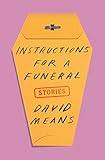 Instructions for a Funeral by David Means: Means’s last publication, Hystopia, was a Booker-nominated novel, but he is still best known for his short stories. Instructions for a Funeral is therefore a return to (the short story) form, 14 pieces, previously published in the New Yorker, Harpers, The Paris Review, and VICE, that display the intelligence and questing range for which Means is known. From a fistfight in Sacramento to a 1920s FBI stakeout in the midwest, Instructions for a Funeral invites readers on a literary journey with a master of the modern short story. (Adam P.)
Instructions for a Funeral by David Means: Means’s last publication, Hystopia, was a Booker-nominated novel, but he is still best known for his short stories. Instructions for a Funeral is therefore a return to (the short story) form, 14 pieces, previously published in the New Yorker, Harpers, The Paris Review, and VICE, that display the intelligence and questing range for which Means is known. From a fistfight in Sacramento to a 1920s FBI stakeout in the midwest, Instructions for a Funeral invites readers on a literary journey with a master of the modern short story. (Adam P.)
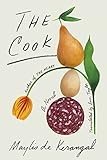 The Cook by Maylis de Kerangal (translated by Sam Taylor): Writes Priya Parmal in her 2014 New York Times review of Maylis de Kerangal’s first novel translated into English, The Heart, “These characters feel less like fictional creations and more like ordinary people, briefly illuminated in rich language, beautifully translated by Sam Taylor, that veers from the medical to the philosophical.” In The Cook, a “hyperrealist” tale centered around a self-taught professional cook, we are treated to “lyricism and [the] intensely vivid evocative nature of Maylis de Kerangal’s prose, which conjures moods, sensations, and flavors, as well as the exhausting rigor and sometimes violent abuses of kitchen work.” The Cook is her 10th novel, her second translated into English (also by Taylor); Anglophones can be grateful that we’re finally catching up with this many-prize-winning author. (Sonya)
The Cook by Maylis de Kerangal (translated by Sam Taylor): Writes Priya Parmal in her 2014 New York Times review of Maylis de Kerangal’s first novel translated into English, The Heart, “These characters feel less like fictional creations and more like ordinary people, briefly illuminated in rich language, beautifully translated by Sam Taylor, that veers from the medical to the philosophical.” In The Cook, a “hyperrealist” tale centered around a self-taught professional cook, we are treated to “lyricism and [the] intensely vivid evocative nature of Maylis de Kerangal’s prose, which conjures moods, sensations, and flavors, as well as the exhausting rigor and sometimes violent abuses of kitchen work.” The Cook is her 10th novel, her second translated into English (also by Taylor); Anglophones can be grateful that we’re finally catching up with this many-prize-winning author. (Sonya)
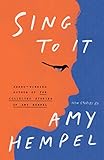 Sing to It by Amy Hempel: Hempel, the short story legend best known for “In the Cemetery Where Al Jolson Is Buried,” is back with her first new collection of stories in over a decade. From “Cloudland,” which depicts a woman’s reckoning with her decision to give up her child, to “A Full-Service Shelter,” which follows a volunteer at a shelter where abandoned dogs are euthanized, the stories in Sing to It are fitting additions to Hempel’s work. (Thom)
Sing to It by Amy Hempel: Hempel, the short story legend best known for “In the Cemetery Where Al Jolson Is Buried,” is back with her first new collection of stories in over a decade. From “Cloudland,” which depicts a woman’s reckoning with her decision to give up her child, to “A Full-Service Shelter,” which follows a volunteer at a shelter where abandoned dogs are euthanized, the stories in Sing to It are fitting additions to Hempel’s work. (Thom)
 The Other Americans by Laila Lalami: Lalami, whose previous novel, The Moor’s Account, was a finalist for the Pulitzer, returns with a “structurally elegant mystery” (Kirkus). At the opening of this highly anticipated new novel, Morroccan immigrant Driss Guerraoui is killed by a speeding car on a California highway. The book then follows a number of characters connected to and affected by his death, including his jazz composer daughter, his wife, and an undocumented immigrant who witnessed the accident. J.M. Coetzee says, “This deftly constructed account of a crime and its consequences shows up, in its quiet way, the pressures under which ordinary Americans of Muslim background have labored since the events of 9/11.” (Edan)
The Other Americans by Laila Lalami: Lalami, whose previous novel, The Moor’s Account, was a finalist for the Pulitzer, returns with a “structurally elegant mystery” (Kirkus). At the opening of this highly anticipated new novel, Morroccan immigrant Driss Guerraoui is killed by a speeding car on a California highway. The book then follows a number of characters connected to and affected by his death, including his jazz composer daughter, his wife, and an undocumented immigrant who witnessed the accident. J.M. Coetzee says, “This deftly constructed account of a crime and its consequences shows up, in its quiet way, the pressures under which ordinary Americans of Muslim background have labored since the events of 9/11.” (Edan)
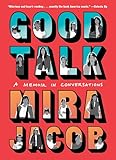 Good Talk by Mira Jacob: A graphic novel about raising her mixed-race son in a white supremacist society by the author of The Sleepwalker’s Guide to Dancing, built around conversations with a curious six year old. Jacqueline Woodson says “In Jacob’s brilliant hands, we are gifted with a narrative that is sometimes hysterical, always honest, and ultimately healing.” (Lydia)
Good Talk by Mira Jacob: A graphic novel about raising her mixed-race son in a white supremacist society by the author of The Sleepwalker’s Guide to Dancing, built around conversations with a curious six year old. Jacqueline Woodson says “In Jacob’s brilliant hands, we are gifted with a narrative that is sometimes hysterical, always honest, and ultimately healing.” (Lydia)
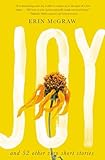 Joy by Erin McGraw: In her newest collection, McGraw gathers 53 “very short stories” about time, religion, class, and relationships. In Publishers Weekly‘s starred review, they said “this quintessential collection of stories serves as an homage to the form while showcasing McGraw’s stunning talent and deep empathy for the idiosyncrasies, small joys, and despairs of human nature.” (Carolyn)
Joy by Erin McGraw: In her newest collection, McGraw gathers 53 “very short stories” about time, religion, class, and relationships. In Publishers Weekly‘s starred review, they said “this quintessential collection of stories serves as an homage to the form while showcasing McGraw’s stunning talent and deep empathy for the idiosyncrasies, small joys, and despairs of human nature.” (Carolyn)
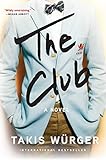 The Club by Takis Würger (translated by Charlotte Collins): German reporter Würger’s debut novel focuses on the Pitt Club, an exclusive all-male dining club, and Hans Stichler, the young boxer tapped to investigate them. Full of secrets, violence, and ruminations on class, the novel explores the dangers of toxic masculinity and the cost of justice. (Carolyn)
The Club by Takis Würger (translated by Charlotte Collins): German reporter Würger’s debut novel focuses on the Pitt Club, an exclusive all-male dining club, and Hans Stichler, the young boxer tapped to investigate them. Full of secrets, violence, and ruminations on class, the novel explores the dangers of toxic masculinity and the cost of justice. (Carolyn)
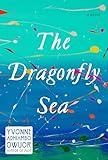 The Dragonfly Sea by Yvonne Adhiambo Owuor: Owuor, whose debut Dust was shortlisted for the Folio Prize, returns with a coming-of-age novel about Ayaana, a young African woman who travels in order to find her place in the world. The book has received starred reviews from both Kirkus and Publishers Weekly—the latter writes, “with a rollicking narrative and exceptional writing, this epic establishes Owuor as a considerable talent.” (Carolyn)
The Dragonfly Sea by Yvonne Adhiambo Owuor: Owuor, whose debut Dust was shortlisted for the Folio Prize, returns with a coming-of-age novel about Ayaana, a young African woman who travels in order to find her place in the world. The book has received starred reviews from both Kirkus and Publishers Weekly—the latter writes, “with a rollicking narrative and exceptional writing, this epic establishes Owuor as a considerable talent.” (Carolyn)
